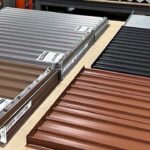Galvalume roofing is a popular choice for homes and businesses. It is known for its durability, long life, and cost-effectiveness. Made from a steel base coated with aluminum and zinc, Galvalume resists corrosion well. This makes it a great option for areas with tough weather. Over the years, many property owners have turned to Galvalume for a reliable and lasting roof.
At Akronroofingexperts, we’ve worked with Galvalume for over 30 years. During this time, we’ve seen its popularity and effectiveness grow. Like any roofing material, Galvalume has its pros and cons. Its resistance to corrosion and ability to handle harsh conditions are strong points. But there are also factors to consider before choosing this material.
If you’re thinking about Galvalume for your next roofing project, this article will give you the key details. We’ll cover its benefits and drawbacks to help you decide if Galvalume is right for you. Let’s dive in and see what makes Galvalume a great roofing choice!
Understanding Galvalume Roofing: Composition and Manufacturing Process
Galvalume is a highly durable roofing material made from a unique blend of metals, making it a popular choice for safeguarding buildings against harsh weather conditions. Known for its strength and longevity, Galvalume provides reliable protection for a wide range of structures.
Manufacturers create Galvalume using a cold-rolled steel base sheet. They coat it with a mix of aluminum and zinc through hot-dipping. In this process, the steel sheet dips into the aluminum-zinc alloy until it reaches the right coating. This coating usually contains about 55% aluminum, 43.4% zinc, and 1.6% silicone. This blend offers great corrosion resistance.
Galvalume roofing is commonly used in a variety of applications, including:
-
Architectural Projects: Suitable for both commercial and residential buildings.
-
Commercial Buildings: Galvalume is used in the roofing of homes, schools, hotels, factories, retail stores, and more.
-
Residential Projects: It’s a popular choice for single-family homes, as well as multi-family dwellings like apartments and condos.
-
Industrial and Structural Uses: Galvalume is often found in warehouses, factories, storage facilities, and similar buildings.
-
Agricultural Buildings: It’s commonly used in barns and other non-animal confinement structures.
-
Miscellaneous Applications: Galvalume roofing can also be found in accent roofs, pavilions, mailboxes, solar trays, and pre-fabricated flashings.
The versatility of Galvalume makes it a reliable and widely used material for a range of roofing projects.
Read More: Top 7 Metal Roofing Options and Their Prices
Advantages of Choosing Galvalume for Your Roof
Guaranteed Quality: One major benefit of Galvalume is its strong 25-year warranty on the substrate, sometimes called a perforation warranty. Many Galvalume systems also include paint warranties. These add extra protection and help keep your roof or wall durable over time. For non-residential buildings, property owners can choose a weathertight warranty. This guarantees proper installation that meets strict standards.
Protection Against Rust & Natural Self-Healing: Galvalume has a unique coating that combines aluminum’s rust resistance with zinc’s self-healing properties. This blend stops red rust from forming on the panel edges. Many steel roofing materials face edge creep from exposed steel, but Galvalume prevents this issue. Therefore, Galvalume roofs are less likely to fail from rust damage.
Ease of Installation: Galvalume is easy to install. There are two common methods: standing seam and exposed fasteners. Unlike other metals, Galvalume is forgiving during installation. This reduces the risk of marks, dents, or scratches on the panels. Its durability also helps installers work more easily. Plus, Galvalume doesn’t need strict ventilation or air gap specifications. This further simplifies the installation process. Overall, it’s a user-friendly choice for metal roofing.
Cost-Effective & Competitive Pricing: Galvalume is a budget-friendly roofing material that provides excellent value. It stands out compared to options like aluminum. For instance, a standing seam Galvalume roof for a 2000-square-foot home usually costs about $42,000. This makes it a smart choice for anyone wanting quality without overspending.
Challenges and Limitations of Galvalume Roofing
Not Ideal for Coastal Environments: Galvalume’s protective coating struggles in coastal areas. These locations face salty air, crashing waves, and marshy conditions. The salt can harm the Galvalume coating, causing roofs and walls to wear down and corrode quickly. For coastal properties, an engineered aluminum roofing system is a better choice. Aluminum resists corrosion and rust from saltwater, providing greater durability over time.
Heavier than Aluminum: Galvalume’s weight gives it strength and durability, but it can stress a building’s structure. It is heavier than aluminum, which is lighter. A typical 24-gauge Galvalume roof weighs about 1 to 1.5 pounds per square foot. In contrast, a .032 aluminum panel weighs less than half that. This added weight may pose issues for some buildings, especially those not designed for extra load.
Potential for Chemical Interaction: Galvalume works best when not in direct contact with certain materials. These include concrete, treated lumber, copper, lead, bricks, and iron. If Galvalume meets water or an electrolyte while touching these materials, galvanic corrosion can occur. This may damage the roofing system. To ensure the best results, avoid these interactions and check material compatibility during installation.
Assessing if Galvalume Roofing Fits Your Needs
Galvalume is a great roofing choice for homeowners and business owners. It combines durability, corrosion resistance, and versatility. However, make sure different building materials work well together. For example, if you want to pair a metal roof with wood shingles, check if the shingles contain chemicals. Some treated wood shingles can react poorly with metal, causing issues over time. Always confirm material compatibility with manufacturers to prevent problems.
Galvalume roofing offers a strong mix of benefits and considerations. Its corrosion resistance and ability to withstand weather make it a reliable choice for various residential and commercial projects. The steel, aluminum, and zinc coatings enhance its strength.
That said, be aware of potential drawbacks. Galvalume may interact with certain materials and can be prone to dents. By weighing these pros and cons against your specific needs and environment, you can decide if Galvalume roofing is right for you.
If you want to see if Galvalume is the best roofing solution for your home or business, click the “Schedule an Inspection” button below. One of our roofing experts will evaluate your situation and help you make an informed choice.



